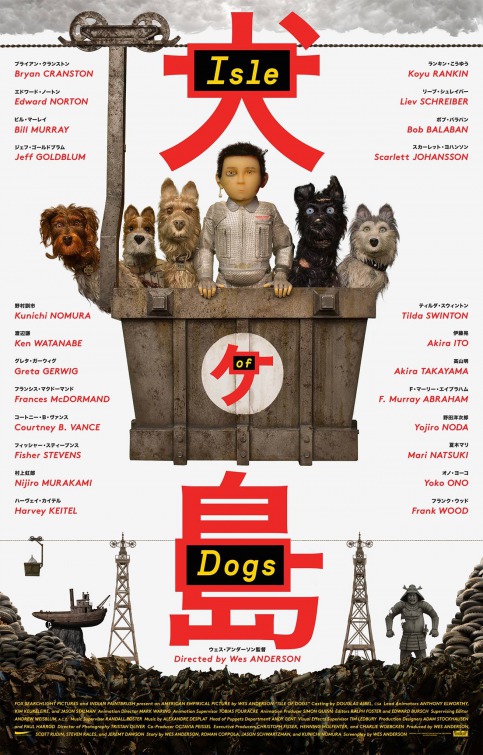Join The Pack
Director
Wes Anderson
Starring
Bryan Cranston
Koyu Rankin
Twenty years in the future, an epidemic affecting dogs has run through Japan. One city, led by Mayor Kobayashi [Kunichi Nomura] passes a law to send all dogs to an island solely designed for dumping refuse. The first dog deported is Spots [Liev Schrieber], guard dog to the Mayor’s distantly related nephew, Atari Kobayashi [Rankin]. Several years later we are introduced to a pack of alpha dogs led by Chief [Cranston], who witness Atari crash land on the island, in an attempt to find and rescue Spots. Feeling an innate loyalty to a human master, the pack (bar Chief) agree to help Atari find his dog.
What used to be an industry standard for visual effects, stop-motion is rarely utilised these days. As it’s such a time-consuming art form, we tend to only see it in the form of a narrative device (often in a fantasy feature), in very independent shorts/features or huge passion projects. The two recent examples that leap to mind are the works being produced by Laika and Aardman Animation, who hold steadfast, keeping the craft alive. But Anderson’s adaptation of Fantastic Mr Fox cannot be overlooked as it was a truly pleasing release, with the practical nature of a need for attention to detail really lending itself to the auteur director’s distinct style. There was also pleasant use of hand-drawn animation doubling for camera footage but if I’m honest, I felt there was a little too much reliance on this method; to the degree that it ended up feeling like a money saving exercise. Either way, the film is visually glorious and no matter what one thinks of the story or its creator, the talent and skill that has gone into presenting this tale is beyond compare.
There is a lot to love about the casting of this film. An opening title card explains (because of course it does, it’s a Wes Anderson film) that subtitles are few and far between and that everyone speaks in their native language, including the canine characters. This tapestry of sound makes for a very interesting and human presentation, that I wish was utilised more in mainstream releases. Films like Inglourious Basterds for example, switching back and forth between various European language with little care for the audience because the story requires it. Equally here, we have the dogs as the main characters, written to be understood by a Western audience and the human component voiced by Japanese actors without subtitles, either dubbed by a translator or left to understand through the visuals of the performance – which speaks to the trust placed upon the animators. It could be argued that the Japanese characters speak with a favouring of monosyllabic phrases and gairaigo to convey to an English speaking audience but I think that speaks more to the difference between the animal and human counterparts than a cultural commentary. The performances themselves, however, are amusing, endearing and exude simple emotion – all necessary requirements for good characters in any animated family film. The performances themselves are quite simplistic and contribute to a wonderful analysis of mistrust and hysteria.
Speaking of cast, there was one element that I had issue with. I completely support the idea of the Japanese cast speaking in Japanese and the dogs being various English-speaking actors; it’s a language barrier that younger audience members would understand – unlike other “talking animal” features wherein the fact both species are speaking the same language but one can’t understand the other is odd. I was also enjoying the cultural setting right up until Tracy Walker (voiced by Greta Gerwig) came along and white savioured the film. For people unfamiliar with the phrase, a white saviour, is when a caucasian character arrives in a foreign land and either leads them to victory or highlights the errors of the ways, elevating their entire society. The character of Tracy herself is passionately written and Gerwig does a wonderful job of voicing her but the fact she’s an outsider who could have quite easily been a Japanese character is a problem.
As a Kurosawa fan, I’m all for cross-pollenisation of cultures and ideas – he being heavily inspired by American cinema, only for his work to go on and inspire American directors; sort of West imitating East imitating West. I also think any story with a futuristic setting understands the melting pot of ideas and cultural aesthetics to create a unified future; features like Blade Runner and Star Trek. This kind of film is one step toward that. Whether it was a clumsy footfall (Lost In Translation) or bold stride (Mulan) is probably not for me to say. When creating Fantastic Mr Fox, Anderson took all the externally visible components of both the English countryside and Roald Dahl’s source material and presented them through his own lens, same for his analysis of Indian culture in The Darjeeling Limited. I wouldn’t say he always gets it right and in doing so inadvertently causes offence at times but bringing something new to an audience who would not experience these things can only be a positive. However, the argument remains that by creating awareness of other cultures, artists have a responsibility to present them as honestly as possible, avoiding stereotypes and ensuring the hero of the story isn’t someone who looks like your target audience just because you feel the need to throw them in there; otherwise we merely perpetuate the cinematic status quo and uncomfortable trends of presenting people as caricatures rather than relatable individuals. But I will admit this film is a heightened reality (as Anderson’s films tend to be) and subsequently, realism isn’t exactly the desired effect.
Then of course we have Anderson himself. It seems whenever Wes Anderson releases a film reviews are divided between those who enjoy his films and those who do not. I will confess, it’s one thing having a signature style, it’s another making the same film over and over; as this leads to eventual stagnation or self-parody. But I believe Anderson is genuinely a very adroit filmmaker and one who has such a persistent and clear vision, free from outside interference or influence. In that regard, his work is so immediately recognisable because it has such a strong and unique voice with all the components conforming to its tropes, quirks and eccentricities. In a similar vein, long-time collaborator Alexandre Desplat is his usual exceptional self and creates a wonderful score rife with inflated action-based tension (the kind we hear in family films that is exciting without being genuinely perilous) and simple moments, threading together the events between the carefully selected indie tracks. I also particularly liked the embedded influence from late 50’s/early 60’s cinema.
In summary, this film is not going to win over anyone on the fence about Wes Anderson. Everything at this stage of his career is in his complete control and unless he makes an exceptionally bold move, I doubt he will diverge from his honed style. But for what it is, Isle Of Dogs is a very colourful, delightfully crafted, whimsical tale with a decent message and enjoyable characters. For fans of his usual fare, this will be a welcome treat and for those who are unfamiliar with or resistant of his previous films, they may get something out of it too.
Release Date:
30th March 2018
The Scene To Look Out For:
This is going to sound like an odd thing to highlight – especially as I intend to be quite vague to avoid spoilers – but toward the end of the film, there is a surgery scene, wherein a character has a kidney extracted. Now, I know it’s not real but presenting an unmoving camera on a detailed open surgery in a PG rated feature is a little unusual. I wouldn’t say it’s a positive or a negative, merely unexpected.. and therefore oddly memorable.
Notable Characters:
**spoilers**
As with all Wes Anderson films, there is always a colourful host of tiny supporting roles that exit as soon as they enter; sometimes even dwarfing the consistently impressive work from the leads. But I was a little surprised by the characters who we would believe to be the main supports. The pack that guides Atari separate and while they were introduced with a fair amount of detail and gravitas, they are dismissed about midway through and all but disappear from the final act. I appreciate they are on the border of the scenes toward the end but I would be curious to know how much of the final runtime goes by without a line of dialogue from either Duke, King, Rex or Boss.
Highlighted Quote:
“I turn my back.. on mankind! Frosted window pane”
In A Few Words:
“Another gleeful absurd story from Anderson brought to life with some truly impressive and captivating visual work”
Total Score: 4/5
![The Red Right Hand Movie Reviews [Matthew Stogdon]](https://reviews.theredrighthand.co.uk/wp-content/uploads/2021/12/cropped-header1.png)




